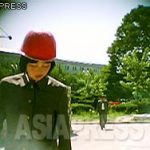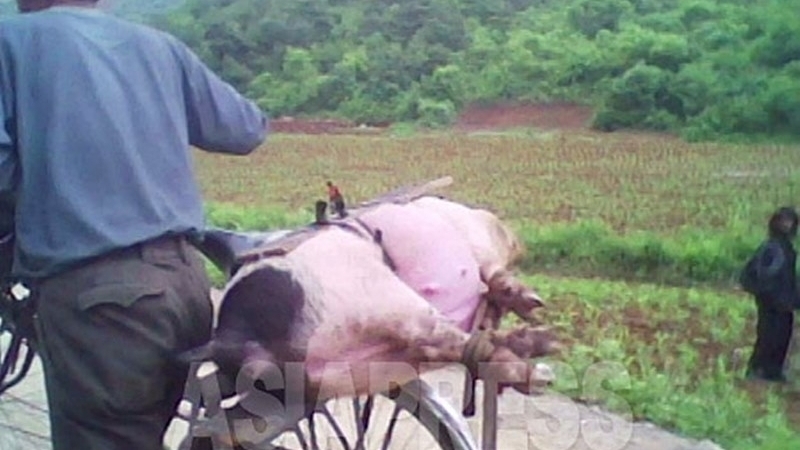
Many North Korean city dwellers are raising goats, pigs and chickens in their homes. With a drastic fall in economic activity and cash income due to the continuing pandemic, many people have turned to raising domesticated animals to earn money. ASIAPRESS recently interviewed a female reporting partner living in the northern part of Ryanggang Province about this. (KANG Ji-won)
◆ Amid poor business conditions, people stop selling goods in markets
―― Why are people raising domesticated animals?
There continues to be a decrease in the number of people doing business in local markets. Business is bad and they would still have to pay fees to maintain their stalls, so an increasingly number of people are abandoning market-based businesses and shifting to raising domesticated animals to sell.
―― What kind of domesticated animals are people raising?
Chickens are standard, and people also raise pigs, rabbits and goats. Goats produce milk, and people sell it for high prices. There are a lot of people who sell goat milk to earn money. Goats are a popular animal to raise, and there’s competition between people who raise them.
―― What about people who live in apartments?
People raise the animals in apartments and one-story houses. It seems like nowadays all apartment dwellers are living with animals. Because it is summer, people have trouble because of the smell of animal poop and flies, but they raise the animals inside because they’d be stolen if they are raised outdoors.
―― How do people feed the animals?
North Koreans don’t have enough food to eat themselves, so the hardest thing for them is to obtain feed for their animals. They feed pigs a mix of grass and human waste, and take goats outdoors to let them feed of weeds.
―― Do people sell the meat from the animals they raise?
No. They sell adult animals that are still alive. People don’t have much income anymore, so everyone is taking great pains to raise the animals. The economy is bad, and the only remaining active market is in selling domesticated animals.
Anyone can raise domesticated animals, so the price of meat has fallen about. Sometimes people even trade the animals for rice. It’s hard for even me to keep track of what’s going on with all the changes.
◆ Survey of market meat prices
Below are market prices for meat in two cities in North Korea. After the North Korean government acknowledged the outbreak of COVID-19 on May 12, the authorities implemented tight restrictions on travel between cities, which led to immense instability in market prices. As a result, the prices below reflect those collected in mid-April. All the products listed are domestically produced. Apart from chicken, is which is counted by the head, all prices are per kilogram. The currency in the table is North Korean won. At the time of the price survey, 1,000 North Korean won equaled 0.154 US dollars.
| Hyesan, Ryanggang Province | “City A” in North Hamgyung Province | |
| Pork | 24,000 | 22,000 |
| Goat Meat | 15,000 | 13,000 |
| Rabbit Meat | 16,000 | 14,000 |
| Chicken Meat | 16,000 | 14,000 |
※ ASIAPRESS communicates with reporting partners through Chinese cell phones smuggled into North Korea.
- <Inside N. Korea> Signs of a new surge of COVID-19 in N. Korea…Restrictions are intensifying again while some suggest that a new variant has hit the country (2022-07-25)
- <Inside N. Korea>Investigating N. Korea’s COVID-19 Situation (2)…Deaths in Yanggang Province…Authorities lift ban on vehicular movement between cities (2022-07-05 )
- <Inside N. Korea>Investigating N. Korea’s COVID-19 Situation (1)…Some areas of N. Hamgyung Province suffer a death rate of 3-5%…Nobody believes the government’s statistics…Increasing deaths of children and elderly people (2022-07-04)
- <Inside N. Korea> Using market surveys to understand the economic situation (2)…Food supply chain is in chaos due to COVID-19, with prices skyrocketing more than 10 times for some items (2022-07-01)
- <Inside N. Korea> Using market surveys to understand the economic situation (1)…Chinese-made products nowhere to be found…Replaced by domestic soap, toothpaste and clothing (2022-06-29)
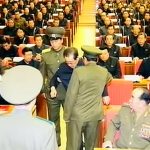
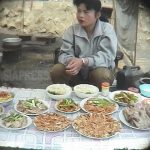
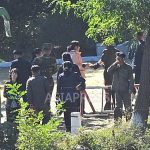
![[Video Report] Fleeing back alley vendors by cracking down](https://www.asiapress.org/rimjin-gang/wp-content/uploads/2018/07/201106-07NK_pyeongyang_gu_0-150x150.jpg)
